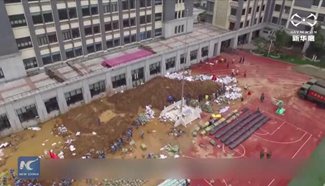GAZA, July 8 (Xinhua) -- The Palestinians marked the second anniversary of the 50-day Israeli massive offensive on the Gaza Strip in 2014, saying their daily life hasn't changed as a world-backed rebuilding plan goes very slowly and the Israeli blockade hasn't been lifted.
Suha al-Masri, a 42-year-old woman from Gaza city said she still remembers the hard and horrible days of the Israeli war when her family house was struck by three missiles from Israeli warplanes. Her cousin was killed in the assault and three other family members were injured.
"I hate to recall the days and nights of the war. I'm still sad because our destroyed house hasn't been rebuilt after two years, the Israeli siege on the Gaza Strip still imposed and the rates of poverty and unemployment still very high," said al-Masri, a mother of four children.
In an official report issued to mark the anniversary, the Gaza health ministry said 2,200 Palestinians were killed in the war, including 550 children and more than 300 women, with around 11,000 injured, including 2,647 children and 1,442 women.
Moreover, 50 days of endless airstrikes and shelling caused serious damage to infrastructure, mainly housing, industry and agriculture facilities. Gaza-based human rights groups said in various reports that 31,974 houses were totally destroyed, or badly and partially damaged.
On Aug. 26, 2014, the day the war ended, the United Nations said 60,612 Gaza residents had fled homes and took refuge at UNRWA schools, hospitals, mosques and churches.
Marking two years since the Israeli war on the Gaza Strip, the Association of International Development Agencies (AIDA) in Gaza called for lifting Israeli blockade and ending all its restrictions that hinder the world-backed and donated reconstruction plan.
AIDA posted a petition on its official website, calling on UN Special Coordinator Nickolay Mladenov, U.S. President Barack Obama, French President Francois Hollande, German Chancellor Angela Merkel, British Prime Minister David Cameron, Norwegian Prime Minister Erna Solberg, EU Vice President Federica Mogherini, and all other world leaders to speed up Gaza reconstruction plan.
"Two years on from the devastating conflict in Gaza, we are calling on you to put pressure on Israel to end the blockade and to immediately remove wood, steel bars, cement, and other essential construction materials from the list of items restricted from entering the Gaza Strip," said the petition.
"So far, only ten percent of the 11,000 totally destroyed homes in Gaza have been fully rebuilt," it said, adding that world leaders have pledged 5.4 billion U.S. dollars to rebuild Gaza. "But Israeli restrictions on the entry of building material are costing reconstruction efforts severe delays."
The war lasted 50 days and ended after Egypt brokered a ceasefire in Cairo between Israel, on one side, and Islamic Hamas movement, the Islamic Jihad and the factions of Palestine Liberation Organization (PLO) on the other side. However, the ceasefire had been frequently violated by both sides.
According to the deal, Israel would ease the blockade, allow reconstruction plan supported by Arab and international donors and not interefere with the construction of a seaport and an airport for the Gaza Strip. However, frustration among the 1.9 million Palestinians in the narrow enclave has mounted as nothing has since changed or improved.
Maher Taba'a, director of Gaza Chamber of Commerce, said the economic losses during the 50-day Israeli war on Gaza in 2014 had grown to 3.6 billion U.S. dollars. "The life condition remained hard, and rates of poverty grew to more than 55 percent."
"During the war, Israel destroyed nine water treatment stations, 18 electricity establishments, 19 financial and banking institutions, 372 commercial and industrial structures and destroyed 55 fishing boats," he said. "This is besides the destruction of tens of thousands of houses."
On Oct. 12, 2014, around 50 Arab and international donor countries held a two-day conference in Cairo, and decided to donate 5.4 billion U.S. dollars to rebuild what had been destroyed by the Israeli army during the war on the Gaza Strip.
Meanwhile, a report published by London-based Amnesty International on Thursday said that in the past two years since the end of the Israeli war on Gaza, no real legal or criminal investigation has been made into the crimes committed by Israel during the war it waged on the enclave.
Despite frustration among the Gaza population, fear for another Israeli war has increased since Israeli Defense Minister Avigdor Lieberman recently warned that if Hamas kept digging tunnels and rockets were fired into Israel, he would suggest Israel wage another war on the Gaza Strip.
"We are very much concerned that there will be another war sooner or later, mainly after Israel's threats and after the Palestinian military groups said they are ready to fight," said Mohamed Abu Daqqa, a 26-year-old teacher from the city of Khan Younis, in southern Gaza Strip.










